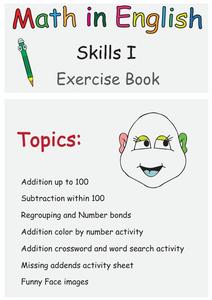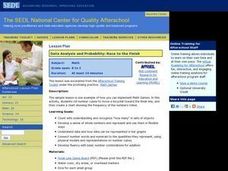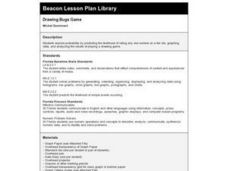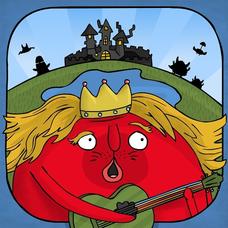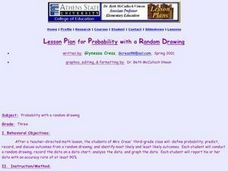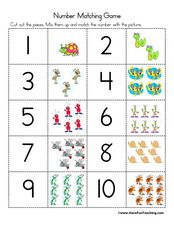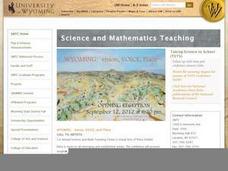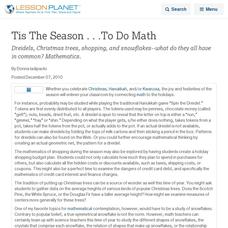Curated OER
Math Games for Skills and Concepts
A 27-page packet full of math games and activities builds on algebra, measurement, geometry, fractional, and graphing skills. Young mathematicians participate in math games collaboratively, promoting teamwork and skills practice.
Curated OER
Run, Gingerbread Men, Run!—Game
Run, gingerbread men! During the board game, four gingerbread men race to discover which one finishes first. Scholars take note of the game's results using a tally chart and bar graph for all to observe the frequency of the winning...
Curated OER
Math in English Skills I Exercise Book: Addition and Subtraction
Whether your pupils need extra help or they simply need to practice their basic computation skills, this packet will do the trick. It includes a written rationale, answer key, and over 10 pages of double-digit addition and subtraction...
Curated OER
Data Analysis and Probability Race to the Finish
Learners practice addition facts, record data, and construct a bar graph. In this probability lesson, students participate in a board game in which bicycles move towards a finish line based on players completing addition problems. Dice...
Curated OER
Drawing Bugs Game
Second graders explore probability by playing a drawing game with dice. After they roll a die, they draw a tree diagram to illustrate each of the possible outcomes.
Curated OER
Probability
Second graders experiment with probability. In this probability lesson, 2nd graders pick colored beans from a bag to find the chance of getting different colors. They make fair and unfair spinners and record the data after spinning...
iMagine Machine
The Land of Venn - Geometric Defense
Young mathematicians use their geometry skills to save the Land of Venn in an engaging math game. A fun way to reinforce children's understanding of basic geometric figures and shapes.
Curated OER
Moving Backward- Probability Enrichment Worksheet
In this addition and subtraction probability worksheet, 2nd graders play a game with a partner. They use the given spinner, and move along a number line based on the positive or negative number that they spin.
Curated OER
Nim: A Game Played All Over the World
Students participate in a European subtraction game. In this subtraction lesson, students use pebbles to demonstrate different subtraction strategies. The students use a deduction strategy to be the first one left with no pebbles.
Curated OER
Probability With a Random Drawing
Students define probability, and predict, record, and discuss outcomes from a random drawing, then identify most likely and least likely outcomes. They conduct a random drawing, record the data on a data chart, analyze the data, and...
Curated OER
Probability Polly
Pupils evaluate if an event is certain, probable, or impossible. They design and create a spinner to be used in a game which demonstrates the possible outcome of an event.
Curated OER
Shape Up!
An outstanding lesson on teaching the basic shapes and polygon names to young geometers is here for you. In it, learners investigate the role of basic polygons in the strength of structures. They use geoboards, rubber bands, streamed...
Curated OER
Design a Spinner
Spinners are usually used in board games not for math, right? Develop your class's understanding of ratios and probabilities with a spinner activity sheet that will require them to draw spinners according to specifications.
Curated OER
Seed Swapping
Here is a fabulous, cross-curicular lesson on seeds. Elements of science, writing, math, agricultural practices, and art are all brought into this incredibly thorough plan. Additionally, a fun whole-class game is presented, and there is...
Education World
High, Low, or In Between?
Trios play a card game that reinforces the concepts of number sequence and greater than and less than. Scholars make predictions based on information they know and a single unknown. They see cards drawn by others in the group, but not...
Curated OER
Fast Facts
Ever use the inner circle/outer circle method of learning? Placing learners in a stationary inner circle and a rotating outer circle, they roll a die and attempt to be the first to call out an addition or multiplication equation with the...
Curated OER
Hershey Chocolate Fractions
In order for students to acquire knowledge about math concepts, and in particular fractions, they need concrete ways to practice an abstract concept.¿¿¿ Using Hershey bars builds on prior knowledge as most students have probably...
Curated OER
No Foot, No Horse
Why do horses wear shoes? Why do people wear shoes? Using worksheets, which are embedded in the plan, learners write descriptive paragraphs about their own shoes, classify a pile of shoes, and also engage in math games about the variety...
Curated OER
Number Matching Game
In this number matching worksheet, students match the numbers 1 - 10 to the pictures of items with that number. Students complete 10 matches.
Curated OER
The Cube and Coin Challenges
Second graders participate in several games based on colored cubes and coins. They try to figure out the relative rate at which things happen and assess the concept of playing a fair game with their peers. Each student compare familiar...
Curated OER
Heads & Tails Data Collection
In this data collection instructional activity, students use a penny and a dime to play a math game. Students flip the money in the cup and then record the number of heads and tails showing marking the coins in the box.
Curated OER
You May Already Be a Winner!
Second graders flip coins and tally the outcomes. They play the You May Already Be a Winner! game with cards under their chairs. Some cards are winners, some might be and the others are not. They play to explain the probability concept.
Curated OER
Probability Plus
Students participate in a variety of activities to understand statistics. They collect and interpret data. Also students distinguish the difference between a population and a sample. They make inferences and create arguments using data.
Curated OER
‘Tis The Season . . .To Do Math
Dreidels, Christmas trees, shopping, and snowflakes--what do they all have in common? Mathematics.


